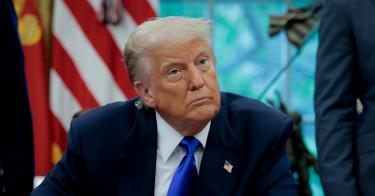During his first 100 days in office, President Trump acted with unprecedented speed to make major changes in government policies and root out the pervasive waste, fraud, and diversity, equity and inclusion poisoning our government and its programs. Still, he was hampered by a handful of biased judges who abused their authority to keep him from implementing the policies the American people voted for.
Jurisdiction is limited to the federal districts where the hundreds of district court judges reside. However, some of these judges arrogantly assert that they can override the president in areas of core executive branch competency and issue sweeping injunctions that affect the entire nation. They even claim they can act on behalf of people who aren’t parties in the cases before them.
These judicial tyrants seem to believe that the Constitution gives them more power than the president to make decisions on the size of the federal government, how it spends its money, and whom it can hire and fire. They say they have a right to overrule the president’s national security judgment on issues that affect our relations with foreign governments, our military readiness, and the safety of the public from unchecked illegal immigration.
The Constitution does not give that authority to the judiciary. Perhaps these judges would like to rewrite President Lincoln’s Gettysburg Address to say we must preserve “government of the judges, by the judges, for the judges.”
Make no mistake: These judges are acting far outside their authority, and their actions are unprecedented.
Last year, the Harvard Law Review noted that of the 127 nationwide injunctions issued since 1963, 64 were against the first Trump administration. Similarly, Justice Clarence Thomas noted in Trump v. Hawaii (2018) that district courts had issued such injunctions in recent years “without considering their authority to grant such sweeping relief.”
Justice Thomas said these injunctions “did not emerge until a century and a half after the founding” and are “inconsistent with longstanding limits on the equitable relief and the power of Article III courts.”
In the case in question, district courts had issued nationwide injunctions against Mr. Trump’s proclamation restricting entry of aliens from eight nations, many of them terrorist states, because of the security threat they posed. As in many of today’s cases on dangerous criminal gangs and terrorist organizations, those judges thought their national security judgment overrode that of the president.
Mr. Trump won that case when the Supreme Court ruled that he was well within his authority to make that judgment and that the admission and exclusion of aliens is a “fundamental sovereign attribute exercised by the government’s political departments largely immune from judicial control.”
Over the past 100 days, we have again witnessed numerous injunctions against actions well within Mr. Trump’s constitutional authority as the chief executive and commander in chief.
Justice Neil M. Gorsuch warned against this type of judicial activism in 2020 in Department of Homeland Security v. New York, a case involving rulemaking on the definition of “public charge” as used in federal immigration law.
In that case, multiple lawsuits had been filed with conflicting rulings by different courts. Justice Gorsuch cynically said these different rulings didn’t matter. “Despite the fluid state of things—some interim wins for the government over here, some preliminary relief for the plaintiffs over there—we now have an injunction to rule them all: the one before us, in which a single judge in New York enjoined the government from applying the new definition to anyone, without regard to geography or participation in this or any other lawsuit.”
>>> The Best Way To Fix Nationwide Injunctions
The Supreme Court stayed that injunction, but it never ruled on the legitimacy of the rulemaking. As soon as the Biden administration came in, it withdrew the government’s appeal and revoked the rule as part of its open borders policy.
Today’s bout of lawfare is still in its preliminary stages, and the substantive merits of the various claims have not yet been decided by federal courts of appeals or the Supreme Court. However, the president has had some significant wins.
Notably, the Supreme Court recently dissolved temporary restraining orders issued by Chief Judge James Boasberg of the U.S. District Court for the District of Columbia in a decision that told Judge Boasberg he lacked jurisdiction over the removal of members of the terrorist group Tren de Aragua. Similarly, the 4th U.S. Circuit Court of Appeals stayed a Biden district judge’s injunction that had told the administration it couldn’t root out DEI poison from the executive branch.
The lawfare against the administration is undoubtedly frustrating, but we’ll see what happens when these cases reach the Supreme Court.
In Trump v. Hawaii, Justice Thomas said that if the “popularity” of nationwide injunctions continues, “this Court must address their legality.”
Let’s hope the justices do that soon.
If the Supreme Court doesn’t take steps to do that, Congress may remove it from the court’s hands and deal with the problem itself.
This piece originally appeared in The Washington Times



